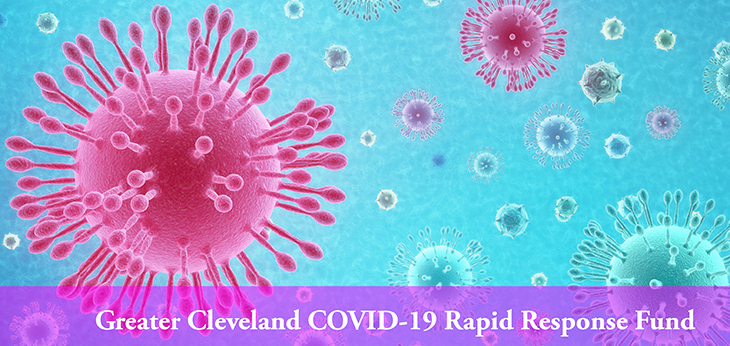Individuals and Organizations Encouraged to Give
On March 18, Philanthropic partners across Northeast Ohio today announced the creation of the Greater Cleveland COVID-19 Rapid Response Fund, which will soon distribute grants to nonprofit organizations serving on the front lines of the pandemic throughout Greater Cleveland.
Contributions to the Rapid Response Fund now total $3.95 million from 18 different organizations.
Funding partners urge other foundations, corporate entities, individuals, and other organizations to contribute to the fund via ClevelandFoundation.org/Response. Donations of any amount are welcomed, and all contributions are tax deductible.
Initial support for the fund was made possible by:
- The Abington Foundation
- The Bruening Foundation
- City of Cleveland
- Cleveland Cavaliers and Rocket Mortgage FieldHouse organization
- Cleveland Foundation
- Cleveland Indians Charities
- Cuyahoga County
- The George Gund Foundation
- HealthComp Foundation
- Jack, Joseph and Morton Mandel Foundation
- KeyBank Foundation
- Sinai Health Care Foundation
- Reinberger Foundation
- Saint Luke’s Foundation
- Sisters of Charity Foundation of Cleveland
- Third Federal Foundation
- The Thomas H. White Foundation
- Key Trust
- United Way of Greater Cleveland
The Rapid Response Fund is designed to complement the work of public health officials and expand capacity in Cuyahoga, Lake and Geauga counties by strategically and efficiently addressing impact from the outbreak.
Initially, grant funding will support nonprofit organizations that provide community safety nets (e.g. food pantries, homelessness and housing assistance, credit counseling, etc.) and have strong experience working with the immediate needs of populations made vulnerable by the COVID-19 pandemic.
Specifically, the Rapid Response Fund will support nonprofit organizations who serve:
- People over 60 years of age, people with compromised immune systems, those who are pregnant, and others with increased health risks associated with the novel coronavirus
- Low-income residents
- Homeless people
- Residents without health insurance and/or access to paid time off work
- People with limited English language proficiency
- Healthcare, service workers, and part-time workers
- People of color
- People with disabilities
- Incarcerated and returning individuals
- Other populations emerging with needs as the crisis unfolds
The Rapid Response Fund will support organizations who deploy resources quickly to meet emergent community needs. Funding partners will also advocate for scaling public sector action, which promote robust and timely public sector financial investment and needed regulatory, administrative, and/or program adaptations to address this crisis, including issues surrounding evictions and utility shutoffs, unemployment benefits, and lapses in health insurance coverage for children and those supported by Medicaid.
In its earliest stages, there will not be a formal request for proposal (RFP) process for organizations seeking grant funds. The funding collaborative will proactively identify potential grantee partners, solicit guidance on proposed projects from community advisors, and recommend final awards.
Grants will be made on a rolling basis as fundraising continues throughout the outbreak, ensuring resources are deployed quickly and nimbly to meet evolving needs in real-time.
Based upon the charitable structure of the Rapid Response Fund, grants are limited to 501(c)(3) nonprofit organizations, groups fiscally sponsored by a 501(c)(3) nonprofit organization, or other charitable organizations able to receive a tax-deductible contribution, such as schools, faith-based organizations and other public entities.
The partners are not able to fund individuals or businesses directly, labor unions, or other 501(c)(4), 501(c)(5) and 501(c)(6) organizations.
For more information or to donate, visit ClevelandFoundation.org/Response.





